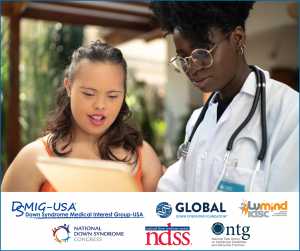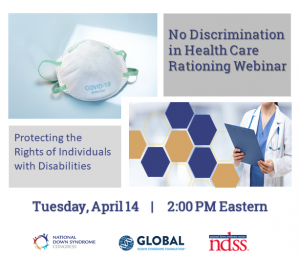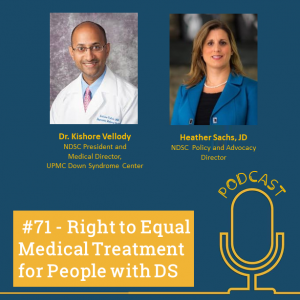Medical Resources & Facts to Follow
Following the lead of the trusted experts at DSMIG-USA (Down Syndrome Medical Interest Group), we have signed onto their position regarding the COVID-19 vaccines that have been approved for people 16 and older. We agree with Dr. Fauci and DSMIG-USA that the vaccines will contribute to the end of this global pandemic.
“Our recommendation is consistent with national and local guidelines for receiving the COVID-19 vaccine. This document contains additional information supporting our recommendation as well as answers to questions we have received. If individuals with Down syndrome or another intellectual disability have concerns about the vaccine, we recommend discussing their concerns with their health care provider.”

NDSC President and Director of the Western Pennsylvania Down Syndrome Center, Dr. Kishore Vellody, and infectious disease expert, Dr. Andrew Nowalk, discuss the current coronavirus (COVID-19) outbreak in a two-part series, what the Down syndrome community needs to know about this virus, who may be at higher risk of serious illness due to underlying medical conditions, and what we know about its potential impact on children with Down syndrome. Check out Part 1 Coronavirus (with Dr. Andrew Nowalk) and Part 2 Coronavirus in Ds #2 – Myths and Truths (with Dr. Andrew Nowalk) on apple podcast.

Join NDSC President and Medical Director, Down Syndrome Center of Western PA, Dr. Kishore Vellody, and NDSC Policy & Advocacy Director, Heather Sachs, JD, as they discuss the rights of people with Down syndrome when it comes to obtaining equal medical treatment, particularly during the COVID-19 pandemic.
You can find the podcast episode here: View podcast (or subscribe to Dr, Vellody’s podcast on your Apple or Android podcast app).
We’re proud to work with other Down syndrome organizations to provide useful information surrounding COVID-19. We hope you find this Q&A an important resource for individuals with Down syndrome and their families, and we will continue to update these documents as we learn more (revised 7/30/20). We have also sent a joint press release to national media sources. This document is also offered in Español.
Abbreviated Version
Expanded Version

In this collaborative webinar presented by NDSC, Global Down Syndrome Foundation, and NDSS, we address the concerns of protecting the rights of individuals with disabilities against health care rationing during the COVID-19 pandemic. Join Heather Sachs (NDSC), Michelle Whitten (GLOBAL), and Ashley Helsing (NDSS) to learn why individuals with Down syndrome considered “high risk” and what families and local organizations can do to advocate for someone with DS who may be hospitalized.
View the Recording
Download Slides
Returning to School or Work in Fall 2020-Adult Down Syndrome Center
Brian Chicoine, MD talks about individuals with Down syndrome, and their families having questions about going back to school and work this fall in light of the ongoing COVID-19 pandemic. He focuses on adolescents and adults with Down syndrome in this article since that is the population that he serves at the Adult Down Syndrome Center.
Other Important Resources
No-visitor policies in health care facilities lend themselves to discrimination against people with disabilities who require support. Please refer to the NDSC document that addresses the Office for Civil Rights (OCR) of the U.S. Department of Health & Human Services ruling on this issue.
For information on preparing yourself, loved ones, and your home, as well as caring for those at the highest risk and other useful resources visit the Center for Disease Control and Prevention (CDC)
Johns Hopkins Virus Map and FAQ
World Health Organization (WHO) Myth Busters – How do you know what you can believe? You know that you can’t believe everything that you read on the internet, but you can believe what the World Health Organization says.
The U.S. Food and Drug Administration is exercising its authority to protect consumers from firms selling unapproved products and making false or misleading claims, including issuing warning letters to firms for selling fraudulent products with claims to prevent, treat, mitigate, diagnose or cure coronavirus disease 2019 (COVID-19).
Our World in Data produced by University of Oxford has up-to-date on the number of COVID-19 cases throughout the world. This data is updated daily and gives information in comparison of different countries and how they are flatting the curve.
National Institutions of Health purpose is too is to grow medical and scientific knowledge that can be used to guard and improve public health. The NIH’s COVID-19 information center can be found here.
The United States Department of Health and Human Services (HHS) is designed to help and enhance the welfare of all Americans by providing health and human services, and supporting advances in public health, medicine, and social services. The CDC, the FDA, and the NIH are all part of the HHS.

